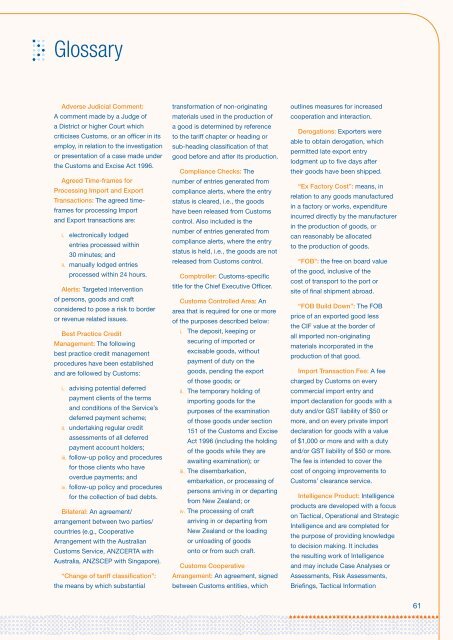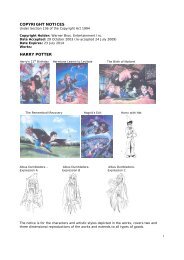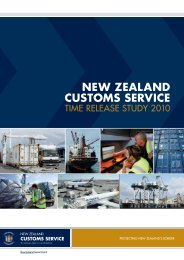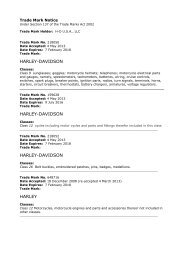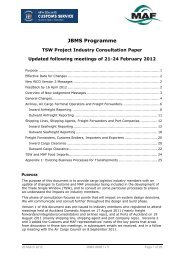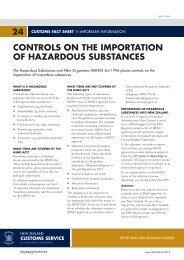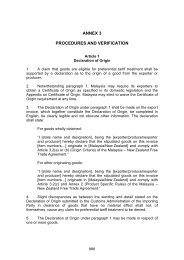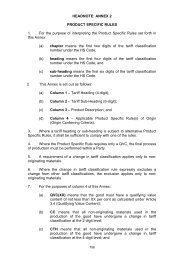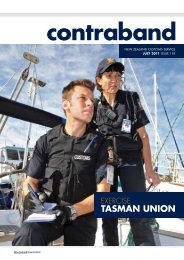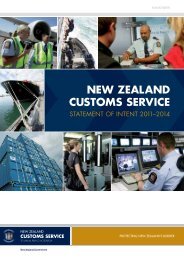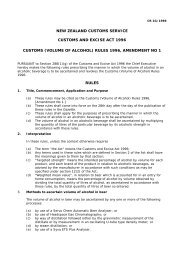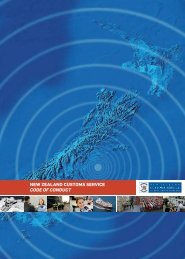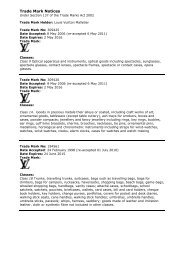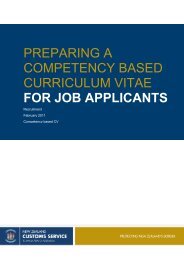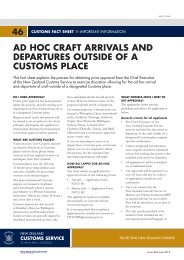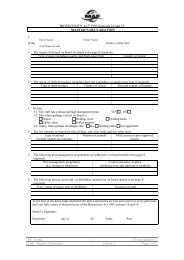Annual Report 2005-2006 - New Zealand Customs Service
Annual Report 2005-2006 - New Zealand Customs Service
Annual Report 2005-2006 - New Zealand Customs Service
Create successful ePaper yourself
Turn your PDF publications into a flip-book with our unique Google optimized e-Paper software.
Glossary<br />
Adverse Judicial Comment:<br />
A comment made by a Judge of<br />
a District or higher Court which<br />
criticises <strong>Customs</strong>, or an officer in its<br />
employ, in relation to the investigation<br />
or presentation of a case made under<br />
the <strong>Customs</strong> and Excise Act 1996.<br />
Agreed Time-frames for<br />
Processing Import and Export<br />
Transactions: The agreed timeframes<br />
for processing Import<br />
and Export transactions are:<br />
i. electronically lodged<br />
entries processed within<br />
30 minutes; and<br />
ii. manually lodged entries<br />
processed within 24 hours.<br />
Alerts: Targeted intervention<br />
of persons, goods and craft<br />
considered to pose a risk to border<br />
or revenue related issues.<br />
Best Practice Credit<br />
Management: The following<br />
best practice credit management<br />
procedures have been established<br />
and are followed by <strong>Customs</strong>:<br />
i. advising potential deferred<br />
payment clients of the terms<br />
and conditions of the <strong>Service</strong>’s<br />
deferred payment scheme;<br />
ii. undertaking regular credit<br />
assessments of all deferred<br />
payment account holders;<br />
iii. follow-up policy and procedures<br />
for those clients who have<br />
overdue payments; and<br />
iv. follow-up policy and procedures<br />
for the collection of bad debts.<br />
Bilateral: An agreement/<br />
arrangement between two parties/<br />
countries (e.g., Cooperative<br />
Arrangement with the Australian<br />
<strong>Customs</strong> <strong>Service</strong>, ANZCERTA with<br />
Australia, ANZSCEP with Singapore).<br />
“Change of tariff classification”:<br />
the means by which substantial<br />
transformation of non-originating<br />
materials used in the production of<br />
a good is determined by reference<br />
to the tariff chapter or heading or<br />
sub-heading classification of that<br />
good before and after its production.<br />
Compliance Checks: The<br />
number of entries generated from<br />
compliance alerts, where the entry<br />
status is cleared, i.e., the goods<br />
have been released from <strong>Customs</strong><br />
control. Also included is the<br />
number of entries generated from<br />
compliance alerts, where the entry<br />
status is held, i.e., the goods are not<br />
released from <strong>Customs</strong> control.<br />
Comptroller: <strong>Customs</strong>-specific<br />
title for the Chief Executive Officer.<br />
<strong>Customs</strong> Controlled Area: An<br />
area that is required for one or more<br />
of the purposes described below:<br />
i. The deposit, keeping or<br />
securing of imported or<br />
excisable goods, without<br />
payment of duty on the<br />
goods, pending the export<br />
of those goods; or<br />
ii. The temporary holding of<br />
importing goods for the<br />
purposes of the examination<br />
of those goods under section<br />
151 of the <strong>Customs</strong> and Excise<br />
Act 1996 (including the holding<br />
of the goods while they are<br />
awaiting examination); or<br />
iii. The disembarkation,<br />
embarkation, or processing of<br />
persons arriving in or departing<br />
from <strong>New</strong> <strong>Zealand</strong>; or<br />
iv. The processing of craft<br />
arriving in or departing from<br />
<strong>New</strong> <strong>Zealand</strong> or the loading<br />
or unloading of goods<br />
onto or from such craft.<br />
<strong>Customs</strong> Cooperative<br />
Arrangement: An agreement, signed<br />
between <strong>Customs</strong> entities, which<br />
outlines measures for increased<br />
cooperation and interaction.<br />
Derogations: Exporters were<br />
able to obtain derogation, which<br />
permitted late export entry<br />
lodgment up to five days after<br />
their goods have been shipped.<br />
“Ex Factory Cost”: means, in<br />
relation to any goods manufactured<br />
in a factory or works, expenditure<br />
incurred directly by the manufacturer<br />
in the production of goods, or<br />
can reasonably be allocated<br />
to the production of goods.<br />
“FOB”: the free on board value<br />
of the good, inclusive of the<br />
cost of transport to the port or<br />
site of final shipment abroad.<br />
“FOB Build Down”: The FOB<br />
price of an exported good less<br />
the CIF value at the border of<br />
all imported non-originating<br />
materials incorporated in the<br />
production of that good.<br />
Import Transaction Fee: A fee<br />
charged by <strong>Customs</strong> on every<br />
commercial import entry and<br />
import declaration for goods with a<br />
duty and/or GST liability of $50 or<br />
more, and on every private import<br />
declaration for goods with a value<br />
of $1,000 or more and with a duty<br />
and/or GST liability of $50 or more.<br />
The fee is intended to cover the<br />
cost of ongoing improvements to<br />
<strong>Customs</strong>’ clearance service.<br />
Intelligence Product: Intelligence<br />
products are developed with a focus<br />
on Tactical, Operational and Strategic<br />
Intelligence and are completed for<br />
the purpose of providing knowledge<br />
to decision making. It includes<br />
the resulting work of Intelligence<br />
and may include Case Analyses or<br />
Assessments, Risk Assessments,<br />
Briefings, Tactical Information<br />
61


